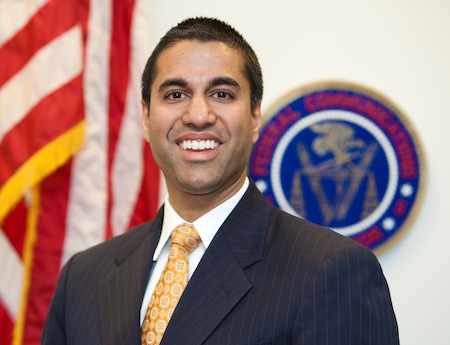FCC's Pai Takes Aim at Dish's AWS-3 Bidding

The smarter way to stay on top of broadcasting and cable industry. Sign up below
You are now subscribed
Your newsletter sign-up was successful
FCC Commissioner Ajit Pai says Dish's use of designated entity (DE) rules makes a "mockery" of the just-completed AWS-3 spectrum auctions. He called on FCC chairman Tom Wheeler to investigate what he calls the DE rule-driven multi-billion dollar subsidies to Dish.
Dish was the second largest bidder with over $10 billion in licenses, including over $3 billion through co-investments with smaller businesses. Dish actually bid about $13.3 billion, but it drops to $10.4 billion with the 25% designated entity discount.
"Those discounts came through the FCC's designed entity program, which is intended to make it easier for small businesses to purchase spectrum and compete with large corporations," said Pai. "Dish, however, has annual revenues of almost $14 billion, a market capitalization of over $32 billion, and over 14 million customers. Its participation makes a mockery of the DE program."
Pai says that Dish's 85% ownership stake in those bidding ventures makes a mockery of the designated entry rules.
The FCC loosened those rules last year to make it easier for small businesses to bid by allowing them to lease the licenses to larger carriers and still get the bidding credits, but Pai dissented saying that it would invite auction end-runs by big business.
Actually, Dish has not gotten the bidding credit yet, but instead has applied for one. The FCC Wireless Bureau will review the request and either grant it or deny it.
“The Commission takes seriously its obligation to provide bidding credits only to those entities that are eligible to receive them," an FCC spokesperson said. "Existing FCC rules mandate that before awarding any license or bidding credit, the Commission conduct a thorough review of every provisional winner to ensure compliance with eligibility rules. For 20 years, the Commission’s competitive bidding rules have provided flexibility to enable a wide variety of applicants – including small businesses – to participate in the auction process, while including safeguards to protect the integrity of its auction program. As part of the auction closing process, the FCC will carefully review winning bidders’ applications before awarding any bidding credits.”
The smarter way to stay on top of broadcasting and cable industry. Sign up below
“We respectfully disagree with the criticism of the Designated Entity program, and we are confident that we fully complied with the DE rules in the AWS-3 auction, which were unanimously approved by the full Commission," Dish said in a statement. "The DE program has been successful in providing much smaller entities the ability to access stronger capital structures, which has facilitated their meaningful participation in an auction process from which they would otherwise be precluded. Our approach — publicly disclosed ahead of the auction — was based on DE investment structures that have been approved by the FCC in past wireless spectrum auctions, including structures used by AT&T and Verizon."
An FCC official who spoke not for attribution put it a bit more bluntly, reflecting the tension between the chairman and Republican commissioners.
"As someone who cut his teeth in the Office of the General Counsel, Commissioner Pai should know FCC rules mandate an investigation into every winning bid to ensure they do not violate the rules," said an FCC official speaking not for attribution. "At the very least his Chief of Staff Matthew Berry should know the rules since they were last modified on his watch. So either they are playing fast and loose with the truth or they simply don't know their stuff."
“Instead of engaging in ad hominem attacks, we urge FCC officials to focus on conducting a top-to-bottom review of what has gone wrong with the DE program and not letting any Fortune 500 company get away with receiving over $3 billion in taxpayer subsidies intended to help small businesses," said a Pai spokesman. "Commissioner Pai warned last year that the Commission was opening the door to regulatory arbitrage. Unfortunately, the Commission went ahead over his dissent and loosened the rules, sending an ‘anything goes’ message to potential bidders. Now is the time for the Commission to reverse course.”
Contributing editor John Eggerton has been an editor and/or writer on media regulation, legislation and policy for over four decades, including covering the FCC, FTC, Congress, the major media trade associations, and the federal courts. In addition to Multichannel News and Broadcasting + Cable, his work has appeared in Radio World, TV Technology, TV Fax, This Week in Consumer Electronics, Variety and the Encyclopedia Britannica.

